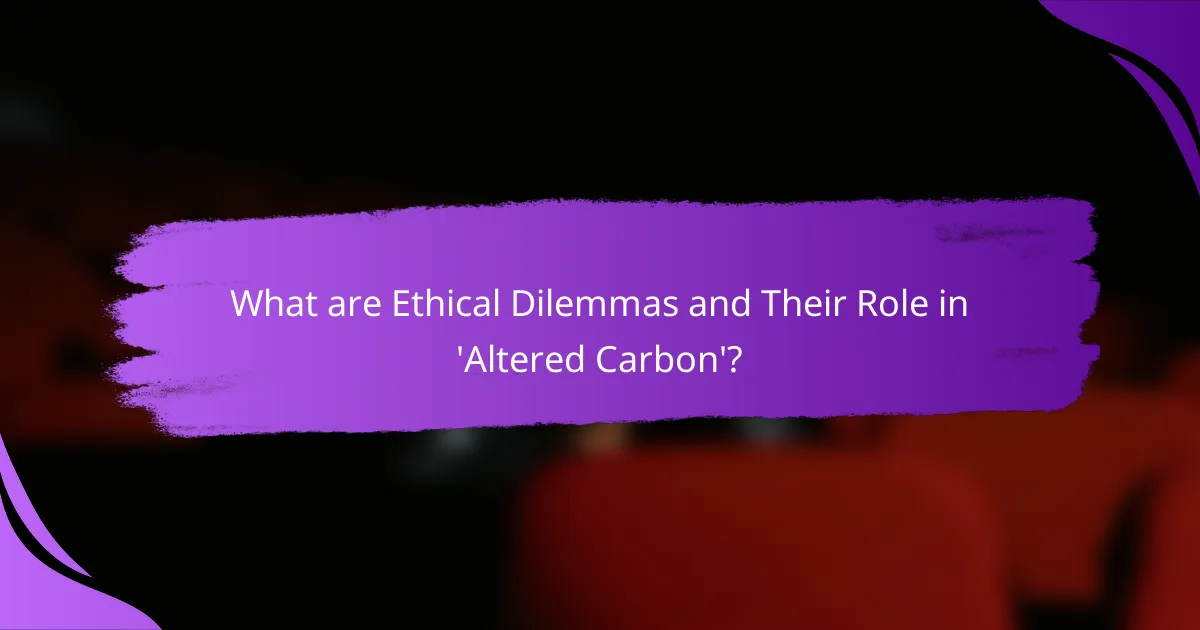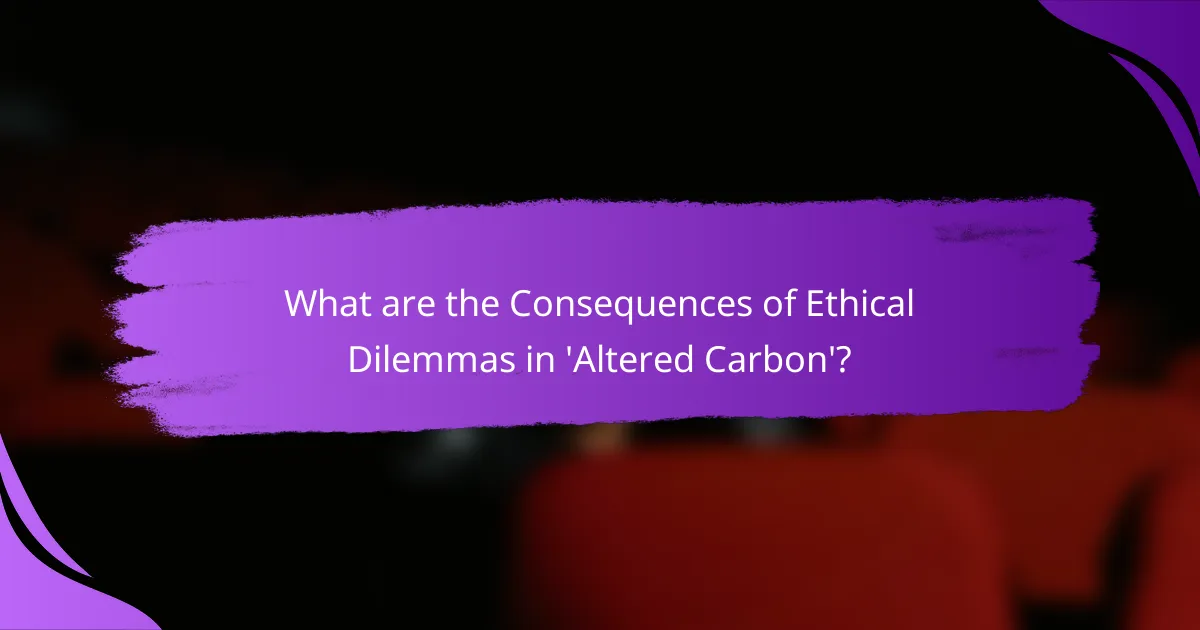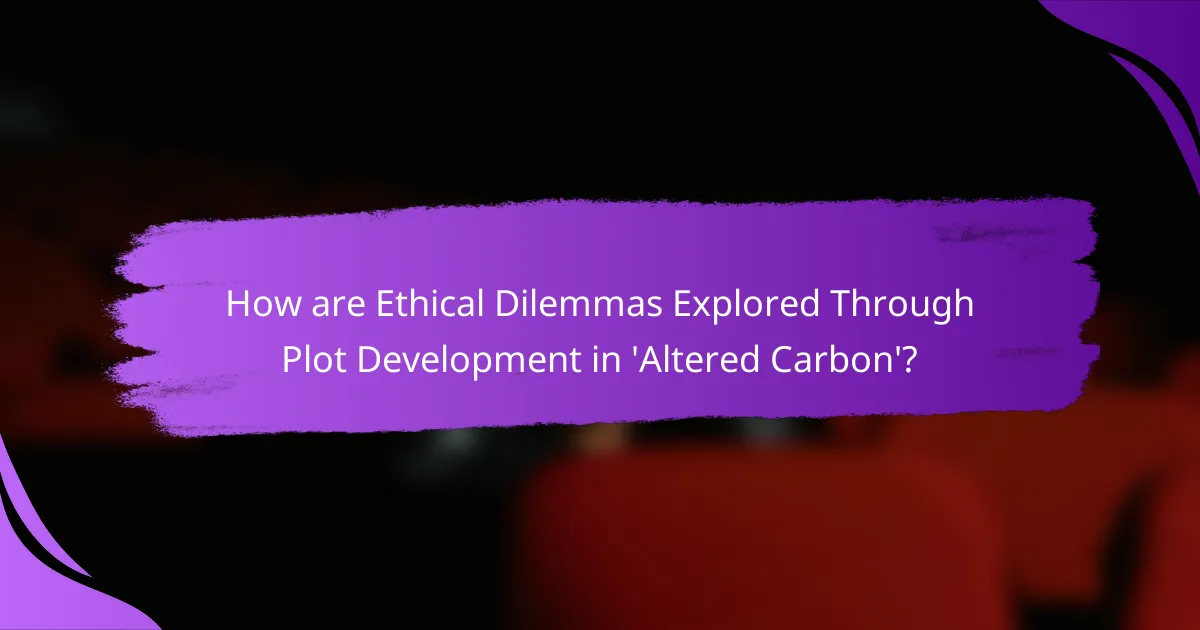The article examines the significance of ethical dilemmas in the plot development of the series ‘Altered Carbon.’ It highlights how characters face complex moral challenges related to identity, consciousness, and mortality, particularly through the technology of consciousness transfer. Key themes include the value of human life, societal inequality, and the psychological turmoil resulting from choices surrounding immortality. The narrative illustrates the profound consequences of these ethical dilemmas on character development and audience engagement, prompting reflection on the implications of technology in human experience.

What are Ethical Dilemmas and Their Role in ‘Altered Carbon’?
Ethical dilemmas in ‘Altered Carbon’ are complex moral challenges faced by characters. These dilemmas arise from the show’s exploration of identity, consciousness, and mortality. Characters often confront choices that question the value of human life and the implications of technology. For instance, the ability to transfer consciousness raises questions about the nature of self. This technology leads to conflicts between personal desires and societal norms. The dilemmas drive character development and plot progression. They highlight themes of power, inequality, and the human condition. Ultimately, these ethical challenges shape the narrative’s direction and impact audience engagement.
How do ethical dilemmas influence character development in ‘Altered Carbon’?
Ethical dilemmas significantly influence character development in ‘Altered Carbon’. Characters face complex moral choices that reveal their true nature. For instance, Takeshi Kovacs grapples with the implications of immortality and identity. His decisions showcase his struggle between personal desires and ethical responsibilities. Additionally, the character of Laurens Bancroft embodies the consequences of wealth and power on morality. His actions highlight the corruption that arises from a lack of accountability. These dilemmas drive characters to evolve, often leading to redemption or further moral decline. Ultimately, ethical challenges shape their arcs and define their relationships within the narrative.
What specific ethical dilemmas do characters face in the narrative?
Characters in ‘Altered Carbon’ face ethical dilemmas related to identity, mortality, and the commodification of consciousness. The transfer of consciousness raises questions about the essence of self. Characters grapple with the morality of using technology to prolong life at the expense of others. The implications of body-swapping highlight issues of consent and exploitation. Additionally, characters confront the consequences of their choices on personal relationships and societal structures. The narrative illustrates how these dilemmas impact their moral compass and drive plot development.
How do these dilemmas shape their decisions and relationships?
Ethical dilemmas significantly shape characters’ decisions and relationships in ‘Altered Carbon.’ Characters often face conflicting values that influence their actions. For example, the choice between loyalty and self-preservation creates tension in relationships. Decisions made under ethical pressure often lead to betrayal or alliance shifts. These dilemmas force characters to confront their morality, impacting their development. The consequences of their choices ripple through their interactions with others. This dynamic illustrates the complexity of human relationships in a morally ambiguous world. Overall, ethical dilemmas serve as a catalyst for character growth and relational evolution.
Why are ethical dilemmas significant to the overarching plot of ‘Altered Carbon’?
Ethical dilemmas are significant to the overarching plot of ‘Altered Carbon’ because they drive character motivations and narrative conflicts. The series explores the implications of consciousness transfer and immortality. Characters face choices that challenge their morals and values. For instance, the ability to switch bodies raises questions about identity and humanity. These dilemmas create tension and complexity in character relationships. The consequences of their choices often lead to profound personal and societal repercussions. This thematic exploration enhances the depth of the story, engaging the audience in philosophical discussions. Ultimately, ethical dilemmas are central to understanding the characters’ journeys and the world they inhabit.
In what ways do ethical choices drive the story forward?
Ethical choices propel the narrative in ‘Altered Carbon’ by creating conflict and tension. Characters face dilemmas that challenge their morals and values. These decisions impact relationships and character development significantly. For instance, the protagonist, Takeshi Kovacs, must navigate complex ethical landscapes. His choices affect not only his fate but also that of others around him. This dynamic drives the plot, as each decision leads to consequences that alter the course of events. The exploration of these dilemmas prompts viewers to reflect on the implications of morality in a futuristic society. Thus, ethical choices serve as a catalyst for character arcs and thematic depth in the story.
How do consequences of these dilemmas affect the plot’s progression?
Consequences of dilemmas significantly drive the plot’s progression in ‘Altered Carbon.’ They create tension and conflict among characters. Each choice leads to unforeseen repercussions that alter relationships and motivations. For example, the decision to transfer consciousness raises ethical questions about identity. These questions complicate character arcs and influence their actions. As characters navigate these dilemmas, the narrative evolves, revealing deeper themes. The plot unfolds through the consequences, showcasing the impact of choices on the world. Ultimately, dilemmas serve as catalysts for character development and plot advancement.

What are the Consequences of Ethical Dilemmas in ‘Altered Carbon’?
The consequences of ethical dilemmas in ‘Altered Carbon’ include moral degradation and loss of identity. Characters face choices that challenge their values. These choices often lead to significant personal and societal repercussions. For example, the ability to transfer consciousness raises questions about the sanctity of life. Characters like Takeshi Kovacs grapple with the implications of immortality. This results in emotional and psychological turmoil. Additionally, societal inequality is exacerbated by the technology. Wealthy individuals exploit it, creating a divide between classes. Ultimately, these dilemmas drive the narrative and character development throughout the series.
How do character choices reflect broader societal issues in the series?
Character choices in ‘Altered Carbon’ reflect broader societal issues such as inequality and identity. The series portrays a future where wealth determines access to technology and life extension. Characters like Laurens Bancroft exemplify the elite’s moral decay, highlighting class disparity. Conversely, characters like Takeshi Kovacs represent the struggles of the disenfranchised. Their decisions often stem from systemic oppression and personal survival. The narrative illustrates how societal structures influence individual ethics. For instance, the choice to engage in violence often stems from desperation in a corrupt system. This interplay between character decisions and societal critique enhances the story’s depth.
What ethical implications arise from the concept of consciousness transfer?
Consciousness transfer raises significant ethical implications concerning identity, autonomy, and the definition of life. The process challenges the notion of self, as transferring consciousness may result in multiple versions of an individual. This multiplicity can lead to questions about which version holds the original identity. Autonomy is compromised when individuals can be transferred without consent or awareness. Additionally, the potential for exploitation arises, as wealthier individuals may have the means to transfer their consciousness, creating social inequalities. The concept also complicates the definition of life and death. If consciousness can be transferred, what constitutes the end of life? These dilemmas reflect broader concerns about humanity and morality in a technologically advanced society.
How do these implications resonate with real-world ethical debates?
The implications in ‘Altered Carbon’ resonate with real-world ethical debates by highlighting issues of identity, consciousness, and morality. The show’s exploration of consciousness transfer raises questions about what it means to be human. This mirrors debates in bioethics regarding cloning and digital immortality. The commodification of bodies in the series parallels discussions on human trafficking and exploitation. Additionally, the moral dilemmas faced by characters reflect real-world challenges in decision-making and ethical responsibility. These narratives prompt audiences to consider the consequences of technological advancements on society. The series ultimately serves as a cautionary tale about the ethical implications of unchecked innovation.
What impact do ethical dilemmas have on audience engagement?
Ethical dilemmas significantly enhance audience engagement. They provoke critical thinking and emotional investment. Audiences are drawn to narratives that challenge moral beliefs. This engagement is evident in ‘Altered Carbon’, where characters face complex choices. These dilemmas create tension and suspense. Viewers become more involved when outcomes are uncertain. Research shows that stories with ethical conflicts lead to deeper discussions. For example, studies indicate that moral ambiguity increases viewer retention. Such narratives encourage reflection on personal values and societal norms.
How do viewers relate to the ethical struggles of the characters?
Viewers relate to the ethical struggles of characters through empathy and personal reflection. Characters in ‘Altered Carbon’ face complex moral dilemmas that resonate with real-life situations. These dilemmas often force viewers to question their own values and beliefs. For example, the issue of identity and consciousness raises questions about what it means to be human. Viewers may see parallels in their own lives, leading to a deeper connection with the narrative. The emotional weight of these struggles often prompts discussions about morality and ethics among audiences. This connection enhances viewer engagement and investment in the story.
What emotional responses do these dilemmas evoke in the audience?
Ethical dilemmas in ‘Altered Carbon’ evoke feelings of confusion, empathy, and moral conflict in the audience. These dilemmas challenge viewers to confront their own values and beliefs. Confusion arises as characters face complex choices with no clear right or wrong answers. Empathy is triggered as audiences connect with the characters’ struggles and emotional pain. Moral conflict emerges when viewers question their own ethical stances. The series uses these emotional responses to deepen engagement with the narrative. This connection enhances the overall impact of the show’s themes on identity and humanity.

How are Ethical Dilemmas Explored Through Plot Development in ‘Altered Carbon’?
‘Altered Carbon’ explores ethical dilemmas through its plot development by presenting characters who face complex moral choices. The narrative revolves around the implications of consciousness transfer and immortality. Characters grapple with the consequences of their decisions, such as identity and morality. The conflict between human experience and technological advancement is central to the story. For example, the protagonist Takashi Kovacs must confront the value of life when bodies can be swapped. This raises questions about the essence of humanity. Additionally, the show highlights the disparity between the wealthy and the poor in accessing technology. These plot elements force viewers to reflect on the ethical ramifications of their own choices. The story effectively illustrates that every decision has profound consequences.
What narrative techniques are used to present ethical dilemmas?
Narrative techniques used to present ethical dilemmas include character development, conflict, and perspective shifts. Character development allows readers to understand motivations and moral complexities. Conflict often arises between characters or within a character, highlighting moral choices. Perspective shifts can present multiple viewpoints on the dilemma, enriching the narrative. Flashbacks may provide context for ethical decisions, revealing past influences. Dialogue can express conflicting values, showcasing differing ethical stances. Symbolism might represent moral choices, adding depth to the narrative. These techniques effectively engage readers with the ethical dilemmas presented.
How does flashback storytelling enhance the understanding of these dilemmas?
Flashback storytelling enhances the understanding of ethical dilemmas by providing context and depth to characters’ motivations. It reveals past experiences that shape current decisions. This technique allows viewers to see the consequences of choices made in earlier situations. For example, in ‘Altered Carbon,’ flashbacks illustrate the protagonist’s traumatic history. These insights create empathy for characters facing moral conflicts. The audience gains a clearer perspective on the stakes involved in their choices. Ultimately, flashbacks deepen the narrative by connecting past actions to present dilemmas. This connection fosters a richer understanding of the complex themes within the story.
What role does dialogue play in revealing ethical conflicts?
Dialogue serves as a critical tool in revealing ethical conflicts. It exposes differing perspectives and moral dilemmas faced by characters. Through conversation, characters articulate their values and beliefs. This process highlights the complexities of their choices. For instance, in ‘Altered Carbon’, dialogue often unveils the tension between personal desires and societal norms. Characters confront each other, prompting reflection on their ethical standpoints. This interaction fosters deeper understanding of the stakes involved. Ultimately, dialogue becomes a vehicle for exploring the nuances of ethical decision-making.
What lessons can be drawn from the ethical dilemmas in ‘Altered Carbon’?
The ethical dilemmas in ‘Altered Carbon’ highlight the complexities of identity and morality. They illustrate the consequences of immortality through technology. Characters face choices that challenge their humanity. The series raises questions about the value of life and the soul. It emphasizes the impact of wealth on ethical decision-making. These dilemmas prompt viewers to reflect on personal values and societal norms. The narrative showcases how choices shape individual destinies and societal structures. Ultimately, it serves as a cautionary tale about the potential dangers of unchecked technological advancement.
How can viewers apply these lessons to their own decision-making processes?
Viewers can apply lessons from ethical dilemmas in ‘Altered Carbon’ to their decision-making processes by analyzing the consequences of their choices. The series illustrates how decisions impact not only the individual but also the broader community. Viewers can reflect on their values and priorities when faced with similar dilemmas. This reflection can lead to more informed and responsible choices. For example, the characters often grapple with moral implications, prompting viewers to consider the ethical dimensions of their actions. Engaging with these narratives encourages critical thinking about personal responsibility. By assessing potential outcomes, viewers can enhance their decision-making skills. This approach fosters a deeper understanding of the complexities involved in ethical choices.
What best practices can writers learn from ‘Altered Carbon’ regarding ethical dilemmas?
Writers can learn to explore complex ethical dilemmas through character-driven narratives in ‘Altered Carbon’. The series showcases characters facing moral choices that question identity and humanity. Writers should emphasize the consequences of these choices on character development. Each decision should reveal deeper motivations and conflicts. Incorporating diverse perspectives enriches the narrative. Writers can also illustrate the societal implications of ethical dilemmas. This approach fosters engagement and reflection in the audience. By presenting multifaceted issues, writers can provoke thought and discussion.
The main entity of the article is ‘ethical dilemmas’ as explored in the series ‘Altered Carbon’. This article examines the significance of ethical dilemmas in shaping plot development, character evolution, and audience engagement. It highlights how characters face moral challenges related to identity, consciousness, and the implications of technology, which drive their decisions and relationships. Additionally, the narrative techniques used to present these dilemmas, such as character development and dialogue, are discussed, along with the broader societal issues they reflect. The article emphasizes the lessons that can be drawn from these dilemmas and their relevance to real-world ethical debates.